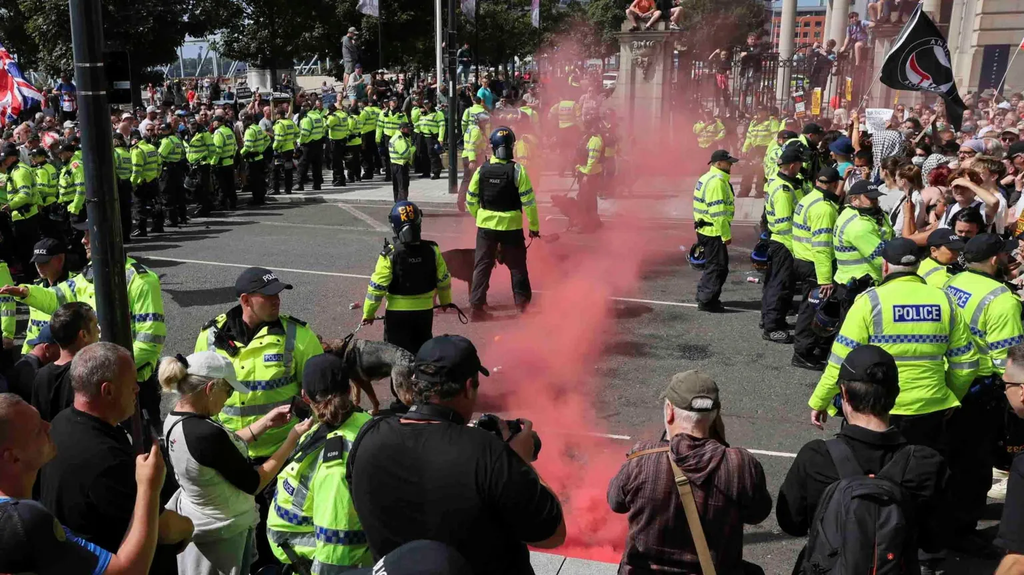Taking advantage of the July 30 knife attack in Southport, a series of online influencers, anti-Muslim extremists and neo-Nazis have incited violence in the UK.
In recent days, unrest has broken out in several towns and cities across the UK, with experts saying the violence was fuelled by misinformation spread on the internet and far-right groups intent on causing trouble following last week’s knife attack in Southport.
A range of far-right factions and individuals – including neo-Nazis, violent football fans and anti-Islam campaigners – have encouraged and participated in the riots. Some online influencers have also incited via social media.
British Prime Minister Keir Starmer announced that more police would be deployed to quell the situation. “This is not a protest that has gone out of control. This is a group of people who are completely deliberately using violence,” he said.
Where did the riots happen?
The first riot occurred on the evening of July 30 in Southport, a town in northwest England. The day before, a knife attack on a children’s dance and yoga class left three girls dead and eight children and two adults injured.
The suspect, Axel Rudakubana, was born in the UK. However, within hours of the attack, false information about the suspect’s identity, such as that Rudakubana was an undocumented migrant, spread rapidly online. Far-right activists used apps like Telegram and X to call on the public to take to the streets.
Police said more than 200 people descended on Southport on the night of 30 July, many arriving by train from other areas. The group attacked a mosque, injured 50 police officers and set fire to vehicles.
On the night of August 1, protesters clashed with police in central London, leading to more than 100 arrests. Smaller disturbances also broke out in Hartlepool, northeast England, Manchester and Aldershot, a town in southeast London.
Northumbria Police said officers were “faced with serious violence” on the night of 2 August as far-right protesters set fires and attacked officers in Sunderland, a city in northeast England.
Violence continued to spread across the UK on 3 August, with incidents in Hull, Leeds, Manchester, Nottingham and Stoke-on-Trent, as well as Belfast, Northern Ireland. In Liverpool, police said more than 300 people took part in the night of 3 August, looting businesses and sending two officers to hospital.
 |
| The first riots occurred on the evening of 30 July in Southport. Photo: PA . |
Which groups are behind this?
Several far-right groups have joined in or promoted the unrest via social media. According to Hope Not Hate, David Miles – a prominent member of the pro-fascist group Patriotic Alternative – shared photos of himself taking part in the Southport riots online.
Other far-right individuals also spread information about the protest, including neo-Nazi group British Movement. Hope not Hate said some of the participants had Nazi tattoos.
Following the Southport riots, police said supporters of the English Defence League were also involved. The riots also attracted individuals who regularly engage in hooliganism at football and other sports matches.
However, officials noted that not all protesters held far-right views.
What is the English Defence League?
Founded in 2009, the English Defence League is a far-right movement notorious for violent protests and anti-Islam, anti-immigration stances.
The group emerged in the town of Luton, where communal tensions have been high after a small number of radical Muslims shouted abuse at British soldiers returning home from Iraq. Luton has long been associated with radical Islam, with a small number of Al Muhajiroun followers – a group linked to the 2005 London bombings – living there.
Stephen Yaxley-Lennon – also known as Tommy Robinson – is one of the founders of the English Defence League. Born in Luton, he was a member of the far-right British National Party (BNP). He has also been involved in football violence and was convicted of leading a brawl in Luton in 2010.
In its early years, the organization staged local protests, such as against mosque planning or placing pig heads around Muslim sites.
According to far-right expert Matthew Feldman, the group represents a new phase in British far-right politics, because unlike parties like the BNP, it does not contest elections.
“This is direct action politics, disseminated and coordinated through new media, from Facebook to mobile phones, from digital film to YouTube,” Professor Feldman wrote in a 2011 study.
In 2013, Mr Yaxley-Lennon announced that he had severed ties with the organisation. Following leadership disputes and internal divisions, the English Defence League no longer officially exists. However, experts say many supporters still operate through other nationalist groups with similar aims and tactics.